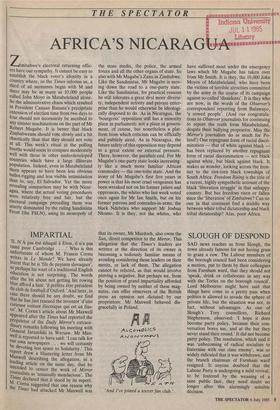THE SPECTATOR
raoxinonooloonimoom ; Indiana University
JUL 1 1 1985
AFRICA'S NICARAG
Library
ANtarissuomoolow Zimbabwe's electoral returning offic- ers have our sympathy. It cannot be easy to establish the black voter's identity in a country where, so the Times informs us, a third of all surnames begin with M and there may be as many as 10,000 people called John Moyo in Matabeleland alone. So the administrative chaos which resulted in President Canaan Banana's precipitate extension of election time from two days to four should not necessarily be ascribed to any sinister machinations on the part of Mr Robert Mugabe. It is better that black Zimbabweans should vote slowly and a bit chaotically than that they should not vote at all. This week's ritual at the polling booths would seem to compare moderately well with those in other underdeveloped countries which have a large illiterate Population. Indeed, even in Matabeleland there appears to have been less obvious ballot-rigging and less visible intimidation than in, say, El Salvador. Yet the more revealing comparison may be with Nicar- agua, where the actual voting procedures were relatively free and fair, but the electoral campaign preceding them was utterly dominated by the ruling Sandinista Front (the FSLN), using its monopoly of
the mass media, the police, the armed forces and all the other organs of state. So also with Mr Mugabe's Zanu in Zimbabwe. Like the Sandinistas, Mr Mugabe is mov- ing down the road to a one-party state. Like the Sandinistas, for practical reasons he still tolerates a great deal more diversi- ty, independent activity and private enter- prise than he would otherwise be ideologi- cally disposed to do. As in Nicaragua, the 'bourgeois' opposition still has a minority place in parliament: not a place in govern- ment, of course, but nonetheless a plat- form from which criticism can be officially and publicly aired. As in Nicaragua, the future safety of this opposition may depend to a great extent on external pressure. There, however, the parallels end. For Mr Mugabe's one-party state looks increasing- ly like a much more familiar African commodity — the one-tribe state. And the irony of Mr Mugabe's first five years in power is that his most cruel vengeance has been wreaked not on his former jailers and oppressors, the whites who last week voted once again for Mr Ian Smith, but on his former patrons and comrades-in-arms, the black Ndebeles who support Mr Joshua Nkomo. It is they, not the whites, who have suffered most under the emergency laws which Mr Mugabe has taken over from Mr Smith. It is they, the 10,000 John Moyos of Matabeleland, who have been the victims of terrible atrocities committed by the army in the course of its campaign against so-called 'dissidents'. It is they who are now, in the words of the Observer's correspondent reporting from Bulawayo, 'a cowed people'. (And our congratula- tions to Observer journalists for continuing to report the truth from Matabeleland, despite their bullying proprietor. May the Mirror's journalists do as much for Po- land!) One repugnant form of racial discri- mination — that of white against black — has been replaced by another repugnant form of racial discrimination — not black against white, but black against black. It makes us wonder, looking across the fron- tier to the riot-torn black townships of South Africa. Freedom Rising is the title of a recent, highly sympathetic account of the black 'liberation struggle' in that unhappy country. But has freedom risen or fallen since the 'liberation' of Zimbabwe? Can no one in that continent find a middle way between white tribal dictatorship and black tribal dictatorship? Alas, poor Africa.


















































 Previous page
Previous page